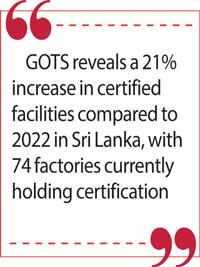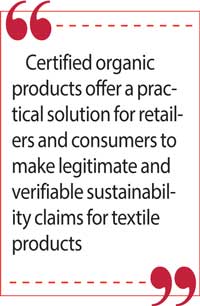Sunday Feb 22, 2026
Sunday Feb 22, 2026
Wednesday, 1 November 2023 00:10 - - {{hitsCtrl.values.hits}}

Apparel embracing Ganesh Kasekar
The half-a-billion dollar global organic textile market1 is set to grow at a compounded annual growth rate of 40% within the next five years and with eco-consumption on the rise, it is evident that apparel companies too, are gearing for the shift in consumer patterns. 2 Sri Lanka, known for its ability to produce high-end niche apparel, is now focused on enhancing its capacity to produce eco-friendly clothing using organic textiles, where compliance remains a key component.
 The Joint Apparel Association (JAAF) notes an increase in Sri Lankan companies obtaining the Global Organic Textile Standard (GOTS), indicating an increased awareness within the industry of the importance of adopting international best practices and sustainable manufacturing. GOTS South Asian Representative Ganesh Kasekar reveals a 21% increase in certified facilities compared to 2022 in Sri Lanka, with 74 factories currently holding certification for the period of 2023/2024. Amongst these Sri Lankan companies, local apparel giants including Hirdaramani International Exports, MAS Intimates and Brandix have also obtained GOTS certification for the sustainable production of children’s wear, ladies’ wear, men’s wear, and baby wear.
The Joint Apparel Association (JAAF) notes an increase in Sri Lankan companies obtaining the Global Organic Textile Standard (GOTS), indicating an increased awareness within the industry of the importance of adopting international best practices and sustainable manufacturing. GOTS South Asian Representative Ganesh Kasekar reveals a 21% increase in certified facilities compared to 2022 in Sri Lanka, with 74 factories currently holding certification for the period of 2023/2024. Amongst these Sri Lankan companies, local apparel giants including Hirdaramani International Exports, MAS Intimates and Brandix have also obtained GOTS certification for the sustainable production of children’s wear, ladies’ wear, men’s wear, and baby wear.
GOTS is recognised as the world’s leading processing standard for textiles manufactured using organic fibres. It defines high-level environmental criteria through the entire organic textiles supply chain and requires compliance with social criteria as well. The successful completion of GOTS certification by an approved certifier provides companies with the right to participate in the GOTS program, including using the standard and the GOTS logo on GOTS-approved goods. With the standard being renewed annually, GOTS 7.0 was launched in March 2023, with full implementation required for all certified entities by March 2024.
GOTS key compliance factors
Built on the three pillars of social responsibility, environmental sustainability and ethical business practices, GOTS covers the production process end to end. “Simply claiming to be sustainable is not enough,” asserts Kasekar. “GOTS has developed standards that cover the entire production process, based on the use of organic fibres, from textile processing and manufacturing up to licensing and labelling. The certification process is rigorous and requires compliance with all criteria, but ultimately leads to an internationally recognised organic certification.”
The certification demonstrates a company’s commitment to providing sustainable, ethical and high-quality products to stakeholders, partners and consumers. Therefore to earn a GOTS certification, textile products must contain a minimum of 70% organic fibres, reflecting a commitment to environmentally friendly materials.
Additionally, stringent criteria govern the use of chemical inputs – ensuring that dyestuffs and auxiliaries meet strict environmental and toxicological standards. Even the choice of accessories is guided by ecological considerations. Notably, a functional waste water treatment plant is mandatory for any wet-processing unit, underscoring the importance of responsible water management. Kasekar adds: “Because of the substantial impact of the textile industry, proper environmental stewardship is imperative. Emphasis on wastewater management and energy conservation is not new. Among the many inputs used in processing, GOTS only allows those with minimum or no ecological impact.”
Under GOTS, social responsibility is strictly based on the ISO, OECD and ILO conventions and stringently adhered to throughout the supply chain. GOTS 7.0 places additional emphasis on due diligence as an integral component of certification.
Worker welfare has been a core priority of all GOTS-certified Sri Lankan companies, with a commitment to preventing and opposing any form of human rights abuse within the supply chain. These companies uphold strict policies against forced and child labour and measures to combat discrimination, harassment and violence. GOTS places special emphasis on safeguarding the rights of female workers, supporting collective bargaining and ensuring occupational health and safety standards. Moreover, companies are required to address fair compensation and assess any disparities in living wages. The GOTS Human Rights and Social Criteria are firmly rooted in international labour and human rights standards, drawing from the United Nations Guiding Principles on Business and Human Rights, OECD guidelines, International Labour Organisation (ILO) Guidelines and other relevant frameworks.
Sustainability at the centre of GOTS
 “Sustainability is no longer just a trendy buzzword,” emphasises Kasekar “Certified organic products offer a practical solution for retailers and consumers to make legitimate and verifiable sustainability claims for textile products. The demand for organic products is strong in the US and EU markets, driven by environmentally-conscious Gen Next consumers.” Stating that the textile industry holds promise in addressing economic challenges in Sri Lanka, he pointed out that it is crucial for local industries to align with sustainability standards, encompassing environmental, social and governance criteria.
“Sustainability is no longer just a trendy buzzword,” emphasises Kasekar “Certified organic products offer a practical solution for retailers and consumers to make legitimate and verifiable sustainability claims for textile products. The demand for organic products is strong in the US and EU markets, driven by environmentally-conscious Gen Next consumers.” Stating that the textile industry holds promise in addressing economic challenges in Sri Lanka, he pointed out that it is crucial for local industries to align with sustainability standards, encompassing environmental, social and governance criteria.
It is evident that compliance certifications play a pivotal role in seamlessly integrating with global supply chains and international trade by adhering to globally accepted trading standards, and ideally emphasised at a time when Sri Lanka seeks export expansion, investor attraction and improved foreign exchange inflow.
These benefits include risk reduction in supply chain management, providing independent credibility as a third-party certification (as opposed to self-claims on sustainable production), ensuring quality through on-site inspection and product testing, building investor and public confidence, enhancing efficiency and productivity through wastewater management and improved eco-efficiency, reducing company costs in supply chain tracing, increasing value addition compared to conventional products, and aiding companies in adapting to increasingly stringent regulatory climates.
In a world where regulatory landscapes are evolving towards greater sustainability, certifications like GOTS help companies adapt to increasingly stringent regulations. This foresight not only ensures compliance but also positions businesses for success in markets with heightened sustainability expectations.
As Sri Lanka apparel looks to the future, it fully acknowledges the myriad advantages offered by the GOTS certification. With a steadfast commitment to upholding GOTS standards in sustainable textile production and trade, the industry is poised to not only thrive but also serve as a beacon of responsible and ethical manufacturing, contributing positively to the global sustainability agenda.
(Endnotes)
1 https://www.factmr.com/report/4377/organic-textile-market#:~: text=The%20market%20for%20organic%20textiles,is%20by%20end%20of%202032.
2 https://www.strategy-business.com/article/The-rise-of-the-eco-friendly-consumer